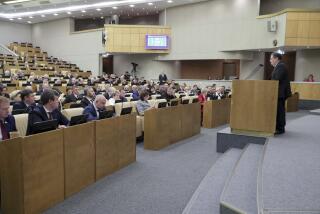Soviet Public to Vote on Reform Plan : Market upheaval: Officials OK national referendum on economy amid fears of panic.
- Share via
MOSCOW — The government plans to call its first national referendum to seek public approval of an economic reform plan that could throw tens of millions of people out of work, Soviet officials said today.
First Deputy Premier Yuri Maslyukov told a news conference that the government believes it must have a clear indication of public support before instituting a program that will switch the country to a market economy.
The plan is expected to double food prices and lead to massive closures of inefficient factories.
No date was set for the referendum.
“If the public refuses to consent to the price rises, then perhaps we will have to resort to round-table discussions,” Maslyukov said in response to a question. There have been calls in the Soviet Union by reformist groups for such discussions with the government and the Communist Party to accelerate political and economic reforms.
The new plan sets target price increases for various sectors of the economy, including an 82% rise in energy prices, an average 43% rise in retail prices and a doubling in the price of food, which is now heavily subsidized.
Deputy Premier Leonid Abalkin told the news conference the potential number of jobs that could be lost might be in the tens of millions, even under the slow, less-drastic response the government is recommending.
The long-awaited plan was approved by President Mikhail S. Gorbachev’s advisory Presidential Council on Tuesday and was to be presented to Parliament on Thursday.
Nikolai Petrakov, Gorbachev’s top economics aide, made it clear in a speech to a Soviet-American trade group that he is unhappy with the proposal, which will increase retail prices on Jan. 1.
Asked if announcing the price increases seven months before they take effect would cause consumers to buy everything now, and cause businesses to hold back their products until the price rise, Petrakov agreed. He said bluntly: “This will create a panic, an economic panic.”
Vladislav Malkevich, chairman of the Soviet Chamber of Commerce, interrupted. “That’s happening now,” he said.
More to Read
Sign up for Essential California
The most important California stories and recommendations in your inbox every morning.
You may occasionally receive promotional content from the Los Angeles Times.













